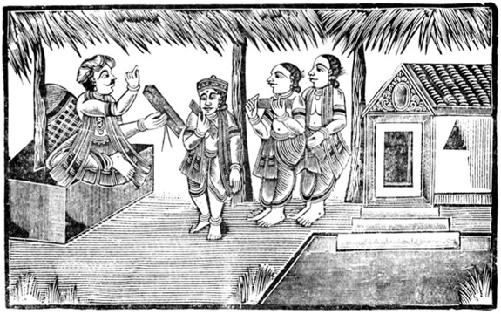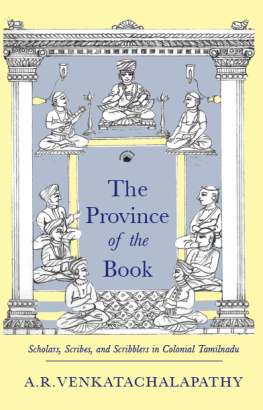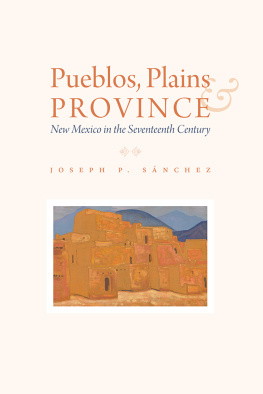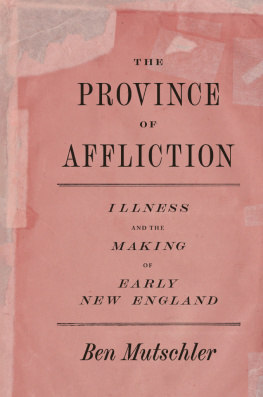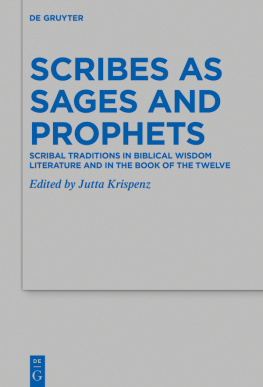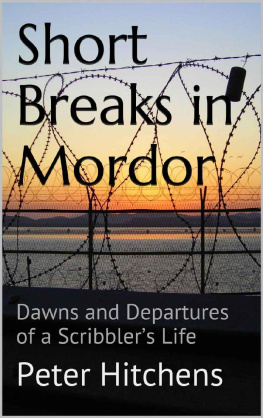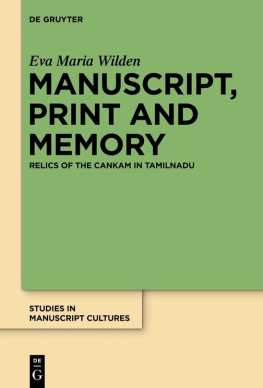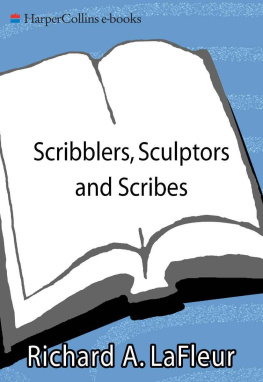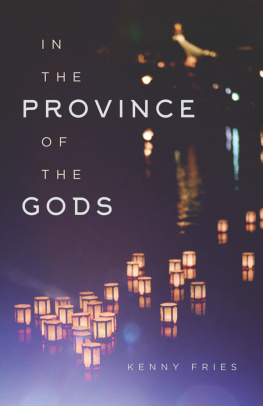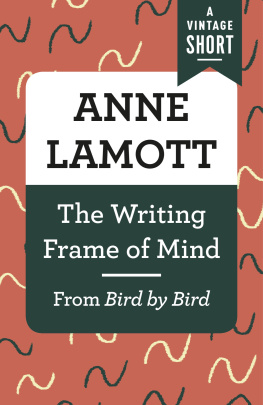The Province of the Book
Published by
PERMANENT BLACK
Himalayana, Mall Road, Ranikhet Cantt,
Ranikhet 263645
Distributed by
Orient Blackswan Private Limited
Registered Office
3-6-752 Himayatnagar, Hyderabad 500 029 (A.P.), INDIA
e-mail:
Other Offices
Bangalore, Bhopal, Bhubaneshwar, Chennai,
Ernakulam, Guwahati, Hyderabad, Jaipur, Kolkata,
Lucknow, Mumbai, New Delhi, Noida, Patna
Copyright 2012 A.R. VENKATACHALAPATHY
eISBN 978-81-7824-506-5
e-edition:First Published 2017
ePUB Conversion: .
All rights reserved. No part of this publication may be reproduced, distributed, or transmitted in any form or by any means, including photocopying, recording, or other electronic or mechanical methods, without the prior written permission of the publisher, except in the case of brief quotations embodied in critical reviews and certain other noncommercial uses permitted by copyright law. For permission requests write to the publisher.
Preface and
Acknowledgements
I n the beginning was the word. And then came print, adding immensely to its fascination. This book is an attempt to combine my academic inclinations and my fascination with print. In the process I have accumulated many debts.
On a rather sultry forenoon in the summer of 1990, walking in to be interviewed for admission to the Centre of Historical Studies (CHS), Jawaharlal Nehru University (JNU), I was confronted by a frighteningly distinguished group of historians. That I could not put precise names to the haze of faces helped mitigate my delirium. Though questions began to fly at me from every direction, I found myself put at ease by my own fluent answers. In fact, I was soon beginning to wonder if it was a delusion that my enthusiastic responses had dazzled the committee! The interview had gone on for a reasonable time when what turned out to be a last question was thrown at me: Who taught the history of Tamilnadu in your MA? I had only been a distance education student, I mumbled sheepishly. This seemed to quell the inquisition.
Fancying that a job in banking would provide me the financial security with which to pursue a literary career (those were the days!), I had, well before taking to history, enrolled for a B.Com. This disabling choice notwithstanding, in my first year of college I ventured into the archives to try tracking the inspiring figure of V.O. Chidambaram Pillai (VOC; 18721936), the early nationalist who launched the first swadeshi shipping company. Soon enough, in the musty corridors of the Tamilnadu Archives, Clio seduced me. By the end of my efforts with commerce I was sure I wanted to be a historian. Dissatisfied with the state of the social sciences in Tamilnadu, I chose to acquire a postgraduate degree in history via a correspondence course while working at the Maraimalai Adigal Library in Chennai. By the time I reached JNU, I had published some books in Tamilan edited volume of VOCs letters; a monograph on the riots following his arrest in 1908; a monograph on the 1921 strike in the Binny Mills, Chennai; an edited volume of Maraimalai Adigals diariesand contributed to journals such as the Economic and Political Weekly (EPW).
To my surprise and relief the CHS not only admitted me, they even said I was at the top of their list. Bliss was it in that dawn I explored the beautiful JNU campus, its bookshops, its library. I read, talked, argued, drafted pamphlets. Given the social stigma attached to studying history in Tamilnadu (Going all the way to Delhi to study history! was my neighbours comment), the pride of place that history commanded in JNU was exhilarating.
With no idea of the demands of tutorial writinga particularly rigorous CHS regimen that I am eternally grateful forI hopped from class to class, auditing courses and attending lectures. It was the last year of teaching for Professors Romila Thapar and Bipan Chandra. Thapars surgical precision when lecturing, and Chandras evangelical zeal in preventing misguided sheep from following the satanic Subalterns, were both in their different ways impressive. And Neeladri Bhattacharyas engagement with the latest in scholarship alongside his insatiable enthusiasm for every new idea were inspirational.
Wanting to keep the questioning to the terrain I was most comfortable in, I had bluffed at the interview that I wanted to work on the Tamil Renaissance. I had no intention of continuing with my earlier work on early nationalism, or on the social history of the Dravidian movement, having wanted to start on something new and fresh. I had spent the preceding three yearsthe single greatest education of my lifeas assistant librarian of the Maraimalai Adigal Library. Founded with Adigals personal collection as the nucleus, the library had been nurtured by the legendary publisher V. Subbiah Pillai and the great bibliophile R. Muthukumaraswamy into arguably the finest collection of Tamil imprints in India at the time. As the person in charge of the library, like a starving cow fallen on a millet field, I spent those years exploring its enormous riches. There could have been no better place to begin thinking about the history of the Tamil book. The chronological edition of Subramania Bharatis poems had been recently published by the Tamil University, Thanjavur. Reading Bharatis poems in that sequence, along with the rich appendices, helped me contextualize the inspirational poet and his work. I had started mulling over the publishing history of Bharatis writings. In the event, I wrote a paper for Professor K.N. Panikkars seminar course on why Bharati, the most important Tamil writer of the twentieth century, had failed to make a living as a writer. Out of this seed grew a doctoral dissertation on Tamil publishing.
With K.N. Panikkar as a sympathetic supervisor, I wrote what someone said (as a compliment, I think) was a very un-JNU-like dissertation. The manuscript was completed in late 1993 and submitted in the first week of January 1994.
Reflecting now on the times when the original thesis took shape, it seems an important moment in the history of the book. I had read my first proofs at 16. By the time I enrolled in JNU I had published a few booksseeing through the press then meant sitting in dingy letterpresses, reading smudged galley proofs, waiting for the foreman to make the pages, and signing strike on the machine proof. I had spent days squeezed in such inky presses gulping cup after cup of sweet tea. My workplace had been essentially a working museum of print. The great nineteenth-century editors Arumuga Navalar and U.V. Swaminatha Iyer would have recognized it for what it was! By the time I finished my dissertation, desktop publishing (DTP) had made its first tentative entry into Tamil book publishing. I was now given the whole proof at one go and returned to an airconditioned computer room to ensure that the corrections had been carried out. The practice of authors arriving from all over Tamilnadu to Chennai to see their books through the pressa practice dating back to the times of U.V. Swaminatha Iyer (18551942) and Veeresalingam Pantulu (18481919)had ceased. Combined with the couriering revolution, the DTP revolution had begun to change the logistics of Tamil book publishing. The boom in English publishing in India had begun too, and Vikram Seths whopping advanceprobably big enough to have bought the entire Tamil book industryfor A Suitable Boy had made headlines. Little did I realize then that alarming elegies to Gutenberg were just round the corner. By the time my thesis was evaluated and I was pondering its publication, I was beginning to wonder if book history was more requiem than record.

